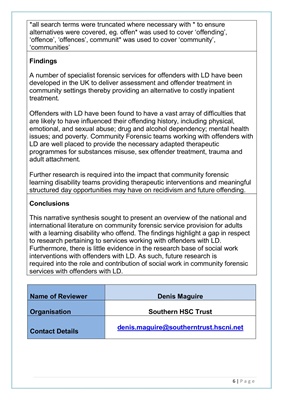
6 | P a g e
*all search terms were truncated where necessary with * to ensure
alternatives were covered, eg. offen* was used to cover 'offending',
'offence', 'offences', communit* was used to cover 'community',
'communities'
Findings
A number of specialist forensic services for offenders with LD have been
developed in the UK to deliver assessment and offender treatment in
community settings thereby providing an alternative to costly inpatient
treatment.
Offenders with LD have been found to have a vast array of difficulties that
are likely to have influenced their offending history, including physical,
emotional, and sexual abuse; drug and alcohol dependency; mental health
issues; and poverty. Community Forensic teams working with offenders with
LD are well placed to provide the necessary adapted therapeutic
programmes for substances misuse, sex offender treatment, trauma and
adult attachment.
Further research is required into the impact that community forensic
learning disability teams providing therapeutic interventions and meaningful
structured day opportunities may have on recidivism and future offending.
Conclusions
This narrative synthesis sought to present an overview of the national and
international literature on community forensic service provision for adults
with a learning disability who offend. The findings highlight a gap in respect
to research pertaining to services working with offenders with LD.
Furthermore, there is little evidence in the research base of social work
interventions with offenders with LD. As such, future research is
required into the role and contribution of social work in community forensic
services with offenders with LD.
Name of Reviewer
Denis Maguire
Organisation
Southern HSC Trust
Contact Details
denis.maguire@southerntrust.hscni.net